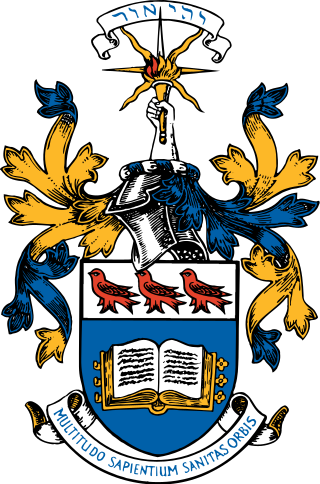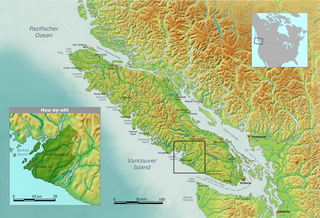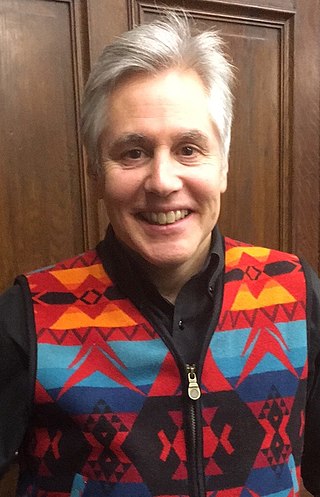Related Research Articles

The University of Victoria (UVic) is a public research university located in the municipalities of Oak Bay and Saanich,British Columbia,Canada. Established in 1903 as Victoria College,the institution was initially an affiliated college of McGill University until 1915. From 1921 to 1963,it functioned as an affiliate of the University of British Columbia. In 1963,the institution was reorganized into an independent university.

Bamfield is a community that is surrounded by Crown Land,First Nation Lands belonging to the Huu-ay-aht Nations,and portions of the Pacific Rim National Park,located on Barkley Sound,Vancouver Island in British Columbia. The community,with a population of 179 as of 2016,is divided by Bamfield Inlet.
Shelagh Rogers,OC,is a Canadian broadcast journalist based in British Columbia. She is the host and producer of CBC Radio One's The Next Chapter,and former chancellor of the University of Victoria.

The Canadian Institutes of Health Research is a federal agency responsible for funding health and medical research in Canada. Comprising 13 institutes,it is the successor to the Medical Research Council of Canada.
The University of Victoria Faculty of Law is a law school at the University of Victoria in Victoria,British Columbia,Canada. The school grants JD,JID,LLM,and PhD degrees in law.

The Huu-ay-aht First Nations is a First Nations based on Pachena Bay about 300 km (190 mi) northwest of Victoria,British Columbia on the west coast of Vancouver Island,in Canada. The traditional territories of the Huu-ay-aht make up the watershed of the Sarita River. The Huu-ay-aht is a member of the Nuu-chah-nulth Tribal Council and is a member of the Maa-nulth Treaty Society. It completed and ratified its community constitution and ratified the Maa-nulth Treaty on 28 July 2007. The Legislative Assembly of British Columbia passed the Maa-nulth First Nations Final Agreement Act on Wednesday,21 November 2007 and celebrated with the member-nations of the Maa-nulth Treaty Society that evening.

Nancy Jean Turner is a Canadian ethnobiologist,originally qualified in botany,who has done extensive research work with the indigenous peoples of British Columbia,the results of which she has documented in a number of books and numerous articles.
Actua is a Canadian charitable organization that delivers science,engineering and technology educational programs to young people in Canada.

Françoise Elvina BaylisFISC is a Canadian bioethicist whose work is at the intersection of applied ethics,health policy,and practice. The focus of her research is on issues of women's health and assisted reproductive technologies,but her research and publication record also extend to such topics as research involving humans,gene editing,novel genetic technologies,public health,the role of bioethics consultants,and neuroethics. Baylis' interest in the impact of bioethics on health and public policy as well as her commitment to citizen engagement]and participatory democracy sees her engage with print,radio,television,and other online publications.
Marion R. Buller,is a First Nations jurist in British Columbia and current chancellor of the University of Victoria. Buller served as the Chief Commissioner for the National Inquiry into Missing and Murdered Indigenous Women and Girls from 2016 to 2019.
Onowa McIvor is an Associate Professor and the former Director of Indigenous Education at the University of Victoria. She is also the President of the Foundation for Endangered Languages in Canada.

John Borrows is a Canadian academic and jurist. He is a full Professor of Law and the Loveland Chair in Indigenous Law at the University of Toronto Faculty of Law. He is known as a leading authority on Canadian Indigenous law and constitutional law and has been cited by the Supreme Court of Canada.
Melina Laboucan-Massimo is a climate justice and Indigenous rights advocate from the Lubicon Cree community of Little Buffalo in northern Alberta,Canada. Growing up with firsthand experience of the effects of oil and gas drilling on local communities,she began advocating for an end to resource extraction in Indigenous territories but shifted focus to supporting a renewable energy transition after a ruptured pipeline spilled approximately 4.5 million litres of oil near Little Buffalo in 2011.

Jocelyn Grant Downie is the James S. Palmer Chair in Public Policy and Law at Schulich School of Law. She was the first Dalhousie scholar to be named a Pierre Elliott Trudeau Foundation Fellow.
Sarah Hunt,also known as Tłaliłila’ogwa, is an Indigenous researcher,author and professor based in British Columbia,Canada. Hunt is a community-based researcher with an academic focus is on Indigenous politics,decolonial methodologies,and issues facing women,girls,and two-spirit people.
Pachena Bay is located 13 km (8.1 mi) south of Bamfield in Pacific Rim National Park at the southern end of Vancouver Island,British Columbia,Canada. It was the location of a First Nation's village that was destroyed by a tsunami in 1700.
Dr Jean Gray is a Canadian academic and retired physician,who is professor emeritus of medical education,medicine and pharmacology at Dalhousie University. She has served as president of the Canadian and American Society of Clinical Pharmacology. She was invested as a Member of the Order of Canada in 2005,and has been a Fellow of the Royal College of Physicians since 2007. She was inducted into the Canadian Medical Hall of Fame in 2020.
Police brutality is an instance or pattern of excessive and unwarranted force used against an individual or group of people. The Indigenous peoples of Canada include,as designated by the Canadian government,Inuit,Metis,and First Nations individuals and are officially considered Aboriginal peoples. Indigenous Canadians have experienced strenuous relationships with police as a result of colonization and lasting tensions. Since the early 2000s,several instances of police brutality against Indigenous Canadians have prompted media attention.
Janet Smylie a Métis family medicine physician. She is a Tier 1 Canada Research Chair in Advancing Generative Health Services for Indigenous Populations in Canada at St. Michael's Hospital.
Kathryn Bridge is a Canadian writer,curator,archivist and historian who lives in Victoria,B.C. In 1978,she began to work at the British Columbia Archives where from 2012 to 2015 she was a Deputy Director. In 2017,she retired and was honoured as Curator Emerita.
References
- ↑ "Castleden, Heather, 1970-". VIAF. Retrieved February 9, 2022.
- 1 2 3 "Dr. Heather Castleden". University of Victoria. Retrieved February 9, 2022.
- 1 2 "Where is she now? Dr. Heather Castleden, PhD" (PDF). Huu-ay-aht Uyaqhmis. December 2008. p. 4. Retrieved February 9, 2022.
- ↑ McDonald, Katie (October 5, 2011). "ON THE FOREFRONT OF ABORIGINAL HEALTH RESEARCH". Dalhousie University. Retrieved February 9, 2022.
- ↑ "Kudos Across Campus". Dalhousie University. July 12, 2010. Retrieved February 9, 2022.
- ↑ "NEW INVESTIGATORS". Dalhousie University. Retrieved February 9, 2022.
- ↑ McNutt, Ryan (September 28, 2009). "SAY HI IN THE COFFEE LINE". Dalhousie University. Retrieved February 9, 2022.
- ↑ Schneidereit, Rebecca (March 5, 2012). "ASSESSING THE HEALTH OF BOAT HARBOUR". Dalhousie University. Retrieved February 9, 2022.
- ↑ McNutt, Ryan (October 2, 2013). "SUPPORTING ABORIGINAL COMMUNITIES". Dalhousie University. Retrieved February 9, 2022.
- ↑ Moffatt Armes, Chris (February 9, 2016). "Supporting cutting-edge research". Queen's University. Retrieved February 9, 2022.
- ↑ Moffatt Armes, Chris (May 17, 2017). "Renewable energy and reconciliation". Queen's University. Retrieved February 9, 2022.
- ↑ "Heather Castleden garners prestigious Fulbright Fellowship". Queen's University. October 8, 2020. Retrieved February 9, 2022.
- ↑ Dal Monte, Richard (September 9, 2021). "Uniting knowledge to tackle climate change". University of Victoria. Retrieved February 9, 2022.
- ↑ "Royal Society of Canada recognizes eight UVic researchers". University of Victoria. September 7, 2021. Retrieved February 9, 2022.